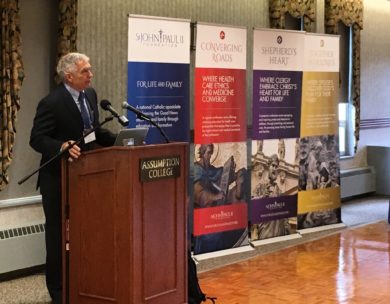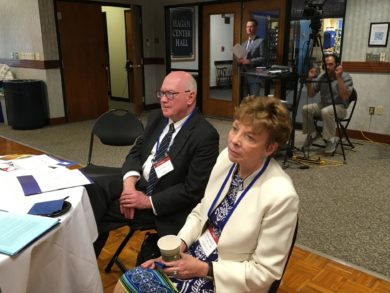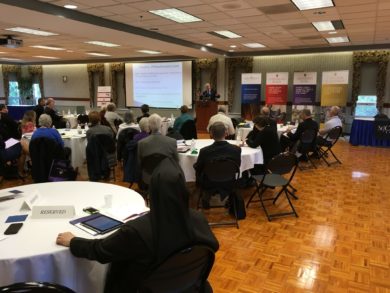October 24, 2017
Conference held to discuss defense of life at end stages
REGIONAL
Story and photos by Carolee McGrath

Dr. William Toffler speaks at the Converging Roads conference on end-of-life issues Oct. 23 at Assumption College.
WORCESTER, Mass. – Priests, religious, lawyers, doctors, nurses and others who work in health care met to discuss defending the sick and dying from efforts to legalize physician-assisted suicide. The Converging Roads conference, which offers continuing education for health care professionals, was held Monday, Oct. 23 at Assumption College, here.
The St. John Paul II Foundation, which is based in Houston, Texas, sponsored the event.

Marie Hilliard (right), director of bioethics and public policy for the National Bioethics Center, and Attorney Henry Luthin listen during the Oct. 23 conference on end-of-life issues.
“This is wrong. This is chilling,” said Dr. William Toffler, a family physician and professor of family medicine at Oregon Health and Science University. Dr. Toffler worked to try to defeat physician-assisted suicide in Oregon. But in 1997, the state became the first in the country to legalize the measure.
“I’m here in Massachusetts to hopefully help Massachusetts not make Oregon’s mistake,” Dr. Toffler told iObserve.
In November of 2012, Massachusetts voters narrowly defeated a similar measure which would have legalized physician-assisted suicide. Over the years, the measure has resurfaced. Currently there are two bills before the Massachusetts legislature that, if passed, would legalize physician-assisted suicide. Both bills were referred to the Joint Committee on Public Health. This is the eighth time a so-called death with dignity measure has been proposed.
Dr. Toffler lost his wife of 40 years to cancer. He said he understands pain, suffering and grief. But he said helping someone commit suicide is not compassion.
“The solution to suffering is not to end the life of the sufferer,” said the father of seven and grandfather. “It violates the 2,400-year-old tradition of doctors not doing harm, nurses not doing harm … Once you let this into your society, there are no boundaries.”
As a physician, he also said pain management and palliative care are the ways to comfort people at the end of life.
“We have relief for people who are suffering. When people are suffering there’s treatment to solve the suffering problem. It might be emotional. It might be physical. It might be spiritual. Thankfully, we have good treatments for all of those,” he said.
Marie Hilliard, director of bioethics and public policy for the National Bioethics Center, spoke on the challenges for health care workers. Hilliard is a registered nurse and canon lawyer.
“Pain is treatable,” said Hilliard, adding there is often pressure for people to choose physician-assisted suicide.

Attendees at the Oct. 23 Converging Roads conference listen to Dr. William Toffler speak about pain management and palliative care.
“It’s the psychological suffering, worried about being a burden on others and if that’s the reason, it’s not about compassion. It’s about not being serviceable or accepted and actually being rejected,” she said.
Deacon Don Philip, from Our Lady of the Rosary and Immaculate Conception parishes in Springfield, attended the conference. Deacon Philip was in Oregon when Death with Dignity became law. He also worked to defeat the Death with Dignity ballot question in Massachusetts in 2012.
“We saw in Oregon once we defeated this it came back again and we lost, bottom line. People become more desensitized to the whole issue,” said Deacon Philip.
“We need to be educated, we need to learn more and share more and not be afraid to talk about the topic,” he added.
Physician-assisted suicide is currently legal in California, Colorado, Vermont, Oregon, Washington, Montana and the District of Columbia.
A video version of this story will be featured on an upcoming edition of “Real to Reel,” which airs Saturday evenings at 7 on WWLP-22NEWS.


 Facebook
Facebook Youtube
Youtube
